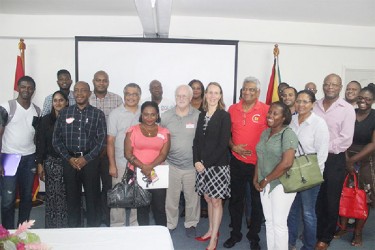A two-day media workshop, aimed at improving elections coverage, closed on Sunday with the Guyana Elections Commission (Gecom) calling for greater partnership between the media and the elections body.
The workshop, organised by the Guyana Press Association (GPA) in partnership with the Canadian High Commission, commenced on Saturday at the CIDA building on Main Street and presented media workers with the opportunity to gain useful information for elections reporting.
Topics included the elements of elections coverage, Guyana’s local government system, and press freedom and political reporting while the forum featured a number of well-known persons, such as local journalist Enrico Woolford, Gecom Commissioner Vincent Alexander, and international journalist Nick Fillmore.
At Sunday’s closing ceremony, Gecom Chairman Dr Steve Surujbally thanked the GPA and the Canadian High Commission for presenting the opportunity for the sharing of ideas and encouraged reporters to engage Gecom.
“The old journalists would know that my doors are always open. The important thing is that we can have dialogue and

we must not in any way feel like it’s us versus them,” the chairman said. He went on, “Gecom will always be open and ready…any answers that you need, any information that you need – I’m saying this publicly in front of your colleagues – it is clear that we will give you the answers.”
However, Surujbally pointed out that in some circumstances information may not be forthcoming and, therefore, journalists should exercise wisdom when reporting without all of the facts. “The onus is on you to take what you have and make your story but you cannot have a situation which you manufacture the news and not report it. You have to report what is factual…,” Surujbally cautioned.
Canadian High Commissioner Nicole Giles explained that the workshop had aimed to reinforce the critical role the media played in strengthening democracy, particularly during electoral processes.
“Democracies are built upon four pillars: legislative, executive, judiciary and media. As when building a house, each of the four pillars needs to be equally strong and operate independently,” Giles said. She further stated, “If one pillar is weaker, shorter or cannot stand alone, the entire democratic structure is compromised.”
She added that the media held a number of responsibilities when it came to elections, including the education of the public on the importance of participation, along with reinforcement of voters’ rights.
Though Giles noted that it is difficult for journalists to not falter on compliance with professional ethics and standards, such as competency, impartiality and integrity, she expressed hope that the workshop’s participants would maintain the profession’s democratic role.
“This is not an easy task and will at times require difficult, and even courageous, decisions. However, I am confident that the media fraternity that is gathered here today will play its role in reinforcing democracy in Guyana,” she said.
President of the GPA Gordon Moseley thanked Giles for the opportunity and encouraged media workers to use the information wisely in their jobs. “Ever so often we have a huge turnover in the media…and ever-so-often it’s important to always update what we know and what we don’t know when it comes to covering elections,” Moseley said. He continued, “I would hope that these training programmes are not just limited to when there’s an elections cycle in the air but that we do it ever so often.”
Moseley also noted development in media coverage of elections over the years. “Over the past two or three elections, the media in Guyana have been making, I think, big improvements when it comes to the coverage of the elections and you can turn to the media monitoring report over those years to see where we’ve come,” Moseley said. He further said, “There will be trying times ahead as we have elections in the air…but I think if we continue being professional at the job that we do, then we won’t have any problems, at least from the press side.”
On the first day of the workshop, attendance was between 20 and 30 persons; on the second day this number plummeted, with just about a dozen participants turning out.
The state media was noticeably missing from the proceedings and Moseley deemed it a worrying trend. “I think it’s disappointing, once again, that when it comes to having a training programme – whether it’s with the Canadian High Commission or the American Embassy or it’s with the British High Commission – we’re not seeing widespread participation from the state media; I think the state media has got to come to the realisation that we’re all in this together as journalists and it’s about getting information out,” the GPA president said.
He expressed hope for greater participation from those media outlets and emphasised that media workers had a responsibility to the people. “They have their readers and we’ve all got to be informed before we inform…so hopefully, there will come a day when we will see the participation of the state media in more of these training programmes; them having their own training programmes with their own state media people is sort of like preaching to the choir,” he said.
The elections writing workshop is one of several that have been held over the years to benefit media practitioners. Recently, on Friday, a five-day media training workshop, held under the theme “Democracy, Journalism, Responsibility: Equipping Media for Enhancing Citizen Engagement,” concluded.




